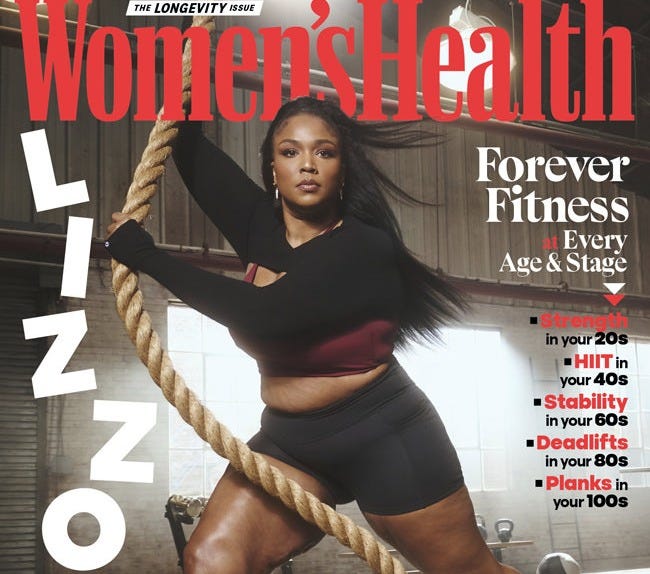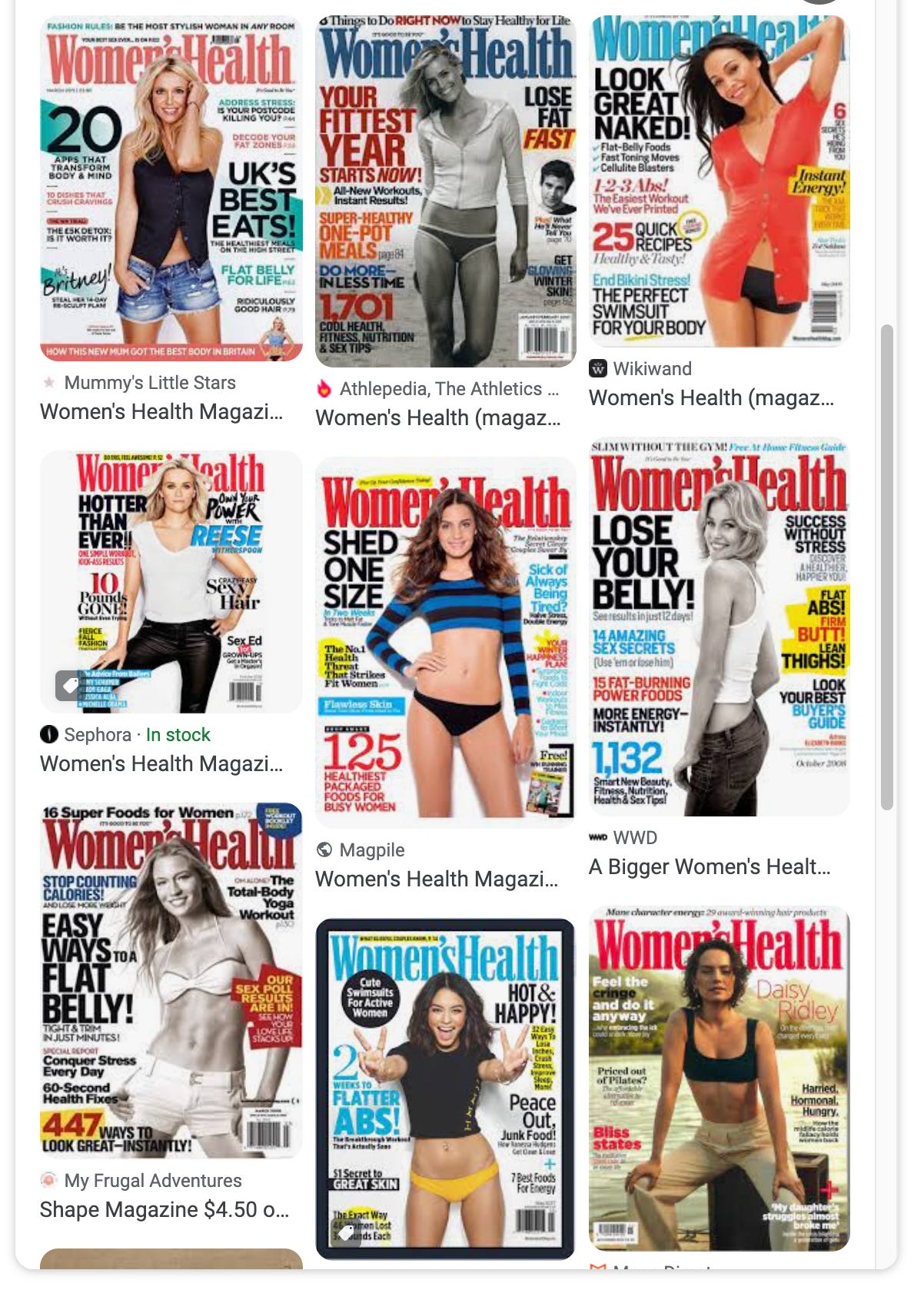Can you see the progress, please?
What this cover story means right now.
I write helpful guides to feeling better in and about your body + body culture essays like this one that has over 78,000 views. If you throw me $4.17/month for an annual subscription you’ll get access to everything and will support more of my kickass work. Please consider upgrading:
Lizzo’s on the cover of the Women’s Health magazine Summer 2025 issue, and when I saw the image and the cover lines I Googled images of covers from years past:
Lose your belly. Flat belly. Flatter abs. Shed a size. 10 pounds gone. Firm butt. Lean thighs. Look great naked. Mostly very lean white women.
On Lizzo’s cover, we’ve got a plus-sized Black woman showing her not-flat stomach, and cover lines about strength, stability, and the mention of being an age over 35 (and menopause!)1 This matters, but I think what Lizzo says inside matters even more.
I’ve written before about how I think it’s a bad idea to uphold any celebrity as a body image icon (or as a behavioral role model, for that matter; see also Lizzo’s legal troubles).
And despite the inclination to consider random things celebrities do as indicative of imminent cultural changes, I don’t think Lizzo appearing on the cover of a magazine is a sign that BODY POSITIVITY IS BACK AGAIN, BABY. I think there will be people online saying that because:
People have been freaking out for at least two years that body positivity is “dead” because Ozempic murdered it, so they want a sign that it’s “back,” and
They measure the strength of the concept of body positivity solely by how many large women exist in the public eye, apparently
You can bet your ass that there will also be people saying the exact opposite: This cover means body positivity is even more dead! because Lizzo lost weight and used a GLP-1 once.
This kind of “Is She BoPo or No???” conversation has me in full Lexi Featherston mode at this point. Body positivity is a concept available to any individual to embrace and define for themselves, it cannot be “killed” by the existence of #SkinnyTok or whatever if it is a core value that truly matters to them, and I find it strange that the people who seem most upset that it’s “dead” are so quick to define it as such; did it only matter when it was especially popular in the mainstream? Was it only worth believing in when it seemed like everyone else did, too?
So if Lizzo’s cover, or any other cover featuring a not-thin person, becomes a superficial conversation about what body-centric movements or trends are “back” or not, I’m out. What really matters about this cover and interview is that it offers a wider understanding of the complexities of bodies, eating, and weight.
Those older issues of WH show how there used to be only one way any mainstream entity talked about women’s bodies and issues. The celebrity quotes within typically had to do with how they got their chiseled abs or managed to stay looking so young. But look at Lizzo’s soundbites:
On struggling with disordered eating—binge eating, specifically—as an adult: “There were times when I would eat so much that my stomach hurt. When I was done, I would be so uncomfortable, I couldn’t breathe and wouldn’t let anyone know. I would hide it … I had so much food noise and connected so much emotion to food. If I were sad, anxious, stressed, or working a lot, I would snack and just eat constantly. And then I would wait for everybody to leave, secretly order two separate meals on a food delivery site, then order dessert on a separate one.”
“It’s okay to gain weight after you’ve released weight, because what you’re not going to do is shame me if my body changes again and I get bigger.”
On not condemning use of GLP-1s, though she ultimately decided they weren’t for her: “If I did all of this on Ozempic, if I did all this with surgery, I would be just as proud of myself, because this sh*t is hard. Everyone who’s ever been in a bigger body knows that this sh*t ain’t easy. Existing isn’t easy.”
“I like how I look now. I still think I’m big. I’m definitely in the ‘two-something to do something’ crew. I’m still wearing plus-size clothing. I have the same rolls. I got the same belly, the same thighs—I think I’m just a smaller version. Body positivity has nothing to do with staying the same. Body positivity is the radical act of daring to exist loudly and proudly in a society that told you you shouldn’t exist.”
When I was a teenager and young adult, the only celebrity woman talking frankly about eating issues, weight cycling, and being 200-plus pounds was Oprah, and she couldn’t do it without shaming the shit out of herself and platforming a bunch of charlatans.
Meanwhile, Lizzo is being real about it all minus the self-flagellation or empty faux positivity. It is insanely refreshing to me, especially as someone who had binge eating disorder, too.
I don’t think the only way our body culture becomes more forgiving is if more not-thin people appear on magazine covers. I think it will do that if more people of all sizes feel they can be vulnerable about the complexities of their bodies. WH has been on this beat: In the spring Hilary Swank was on the cover and discussed becoming a mom at 48. I imagine that was meaningful for women who got pregnant later in life, given the ol’ biological clock pressures thrust upon us.
Despite the lamentations I often see online, I don’t think this moment in body culture is like the early 2000s all over again. I don’t think we’re back where we used to be, even if some trends repeat themselves or we haven’t made ideal progress in all ways. Lizzo’s feature, besides that she looks different from the typical early-aughts cover girl, represents the progress that people might not see if they’re stuck rehashing the worst of the past:
More women of any size feel that exercise spaces are for them, not just skinny women or men; disordered eating experiences are less cloaked in shame and misunderstanding; most people are seeking balance over extremes; GLP-1s are becoming less stigmatized (which I see as a positive thing for fat people who’ve struggled with their weight and disordered eating for years; already-skinny celebrities are perhaps another story); body positivity is poised to be redefined for the better in a rapidly changing culture.
There’s other good stuff, too: The top researchers studying obesity agree that weight is not solely a matter of personality responsibility or moral failing. The American Medical Association has recognized that BMI alone is an imperfect measure of health. Some asshole on TikTok got fired for being fatphobic. Come on! These things suggest something positive about our culture even if it’s not a body image utopia for all.
The idea that we’ve made no progress just because low-rise jeans are trending2 and some social media-addicted teenagers want to be a size 0 is so grim. Let’s give ourselves some credit. Look at what we’re talking about that we didn’t used to. Look at the images available to us. Look at the stories people are sharing.
That you’re worried we haven’t made progress is actually a form of it. There was probably a time you didn’t care about progress at all.
Full cover and cover lines here, I had to crop it.
Are they still? Idk. The world of jean trends is really none of my business.







i agree that covers like this, esp as a gen x-er, are encouraging. but i also wonder whether they represent what is happening in real life.
perhaps because i've been allowing myself to go down the perimenopause online rabbit hole, i have been in somewhat of a negative spiral about the new "expectations" of middle aged women to not gain a single pound. apparently it is a HUGE trend (?) amongst fit and non-overweight middle aged ladies to microdose GLP-1s out of frustration with 10-20 lb weight gain. i TOTALLY understand the frustration with weight gain despite continued exercise and good nutrition, but a big part of me is just like... SIGH, how will this make me feel about myself?
truthfully, i am vain enough to resent how i look next to others as a graying, non-botoxed, mid-sized 40-something year old (but also not vain enough to do any of those things).
When I saw this cover, my first thought was she looks beautiful! I didn’t realize it was Lizzo. I didn’t notice that she didn’t have a flat stomach or that she had thighs heavier than some would approve. She just looked terrific! Wish that’s how people saw things w/o judgment & with positivity. Maybe someday…..